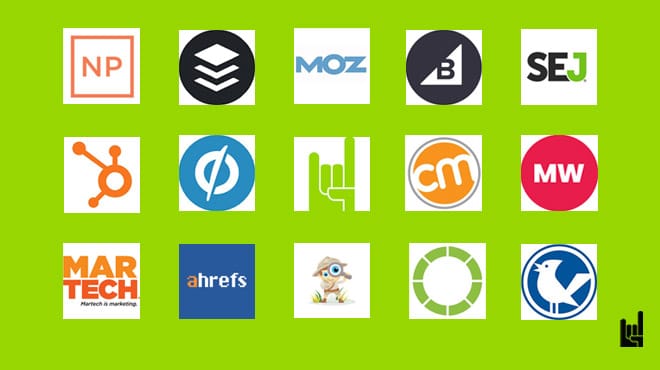Maybe you don’t know the acronym per se but the companies behind the acronym, namely Google, Amazon, Facebook, Apple, and Microsoft. Also known as The Big 5 Tech.
What’s also known is the power of these tech giants. GAFAM is not only pretty valuable, but they are also the leading companies that impact deeply many sociocultural aspects of life and drive social change. All of them are also very American.
Do you know which other firms are also very strong but not very American? The BATX companies. So who is the BATX?
What is BATX?
BATX stands for Baidu, Alibaba, Tencent, and Xiaomi. The acronym is used to describe the four biggest tech firms in China. These tech companies are the tech leaders of China. All four have not only dominated the Chinese market for years but they are also expanding globally.

The BATX companies have been nurtured by the Chinese government for the most part while the latter installed barriers for their Western counterparts, GAFAM, and other tech firms so that BATX can grow safely and get big as soon as possible.
Without competition from foreign businesses, and by playing their cards right, BATX managed to flourish and expand globally. Thanks to research, development, acquisitions, and the blessings of the Chinese government, each of the BATX has a massive and wide business portfolio with software, hardware, and above all – investment.
Let’s take a closer look at each one of the BATX tech companies, from B to X.
1. Baidu
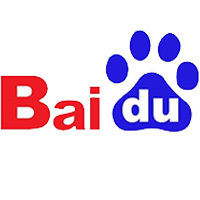
Founded: January 18, 2000
Founders: Robin Li, Eric Xu
Revenue: $18.98 billion (2023)
Employees: 39,800 (2024)
Headquartered in Beijing, in the Haidian Province, Baidu is one of the largest artificial intelligence and internet companies in the world. Baidu is mostly known for being China’s go-to search engine.
This BATX company has over almost 700 million active users with more than 70% of its revenue coming from advertising. Baidu is also been publicly traded since 2005 with a lot of success. Two years later, in 2007, Baidu became the first Chinese company to be included in NASDAQ’s list of 100.
Now, Baidu is the second-largest search engine in the world. Baidu holds approximately 60% (76% on mobile) of the total search engine market share in China. On the contrary, Google China, the subsidiary of Google that operates in China comes fifth, after other Chinese search engines like Shenma, 360 Search, and Sogou. Its global search engine market share is no more than 2%.

But Baidu’s activities and ambitions go far beyond being just a search engine. In 2017, the tech giant founded Apollo, a separate flagship project within the company, which develops autonomous driving technology. As of early 2024, Apollo Go provided over six million driverless rides and was nearing profitability, expected to break even by the end of the year and turn profitable in 2025.
2. Alibaba
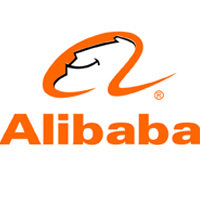
Founded: June 1, 1999
Founders: Yun (Jack) Ma
Revenue: $126.45 billion (2023)
Employees: 204,891 (2024)
Founded in 1999 by English teacher Jack Ma, Alibaba is the largest eCommerce company in China, and one of the largest such companies in the world. Today, Alibaba is more than an eCommerce company. Besides its eCommerce services, it offers cloud services, online banking, advertising services, and much more.
This BATX firm started as an online B2B marketplace that brought manufacturers together with companies for wholesale orders. Later, however, it started selling everything to everyone, as its competitors, Amazon and eBay did, and still do.
To achieve this, Alibaba made 3 different platforms: Alibaba, Taobao, and Tmall.
Alibaba (Subsidiary)
The homonym platform of Alibaba Group continued the original activities of Alibaba and it’s responsible for the B2B part.
Alibaba is the platform that connects manufacturers with merchants. Through alibaba.com, a company can find the products it likes and import them wholesale. In fact, many commercial companies that sell products on Amazon get them from Alibaba. The difference between Alibaba and Amazon is that the former is a platform that does not sell anything to consumers directly nor does interfere in the buying and selling or the delivery of the products. It is simply the link between sellers and buyers.
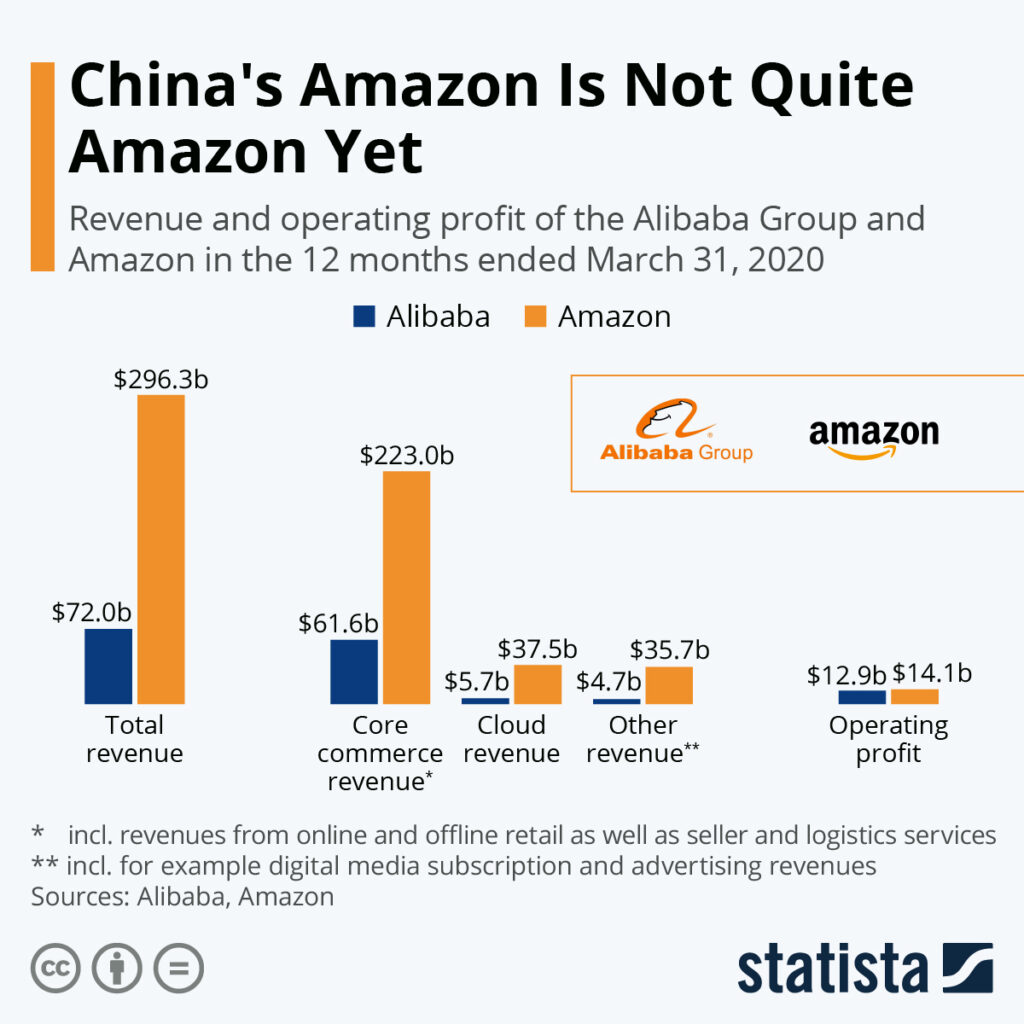
On the other hand, Amazon is a logistics powerhouse: it’s a reseller that has its own warehouses and delivery processes. It sells directly to consumers and undertakes the delivery of products.
Taobao
Taobao is an online C2C marketplace. It is the equivalent of eBay.
This Alibaba Group subsidiary brings together small businesses and ordinary consumers who want to sell something to other consumers. Sellers are able to post items for sale either through a fixed price or an auction.
The platform has about more than 610 million daily active users. The list of products available on Taobao includes more than 1 billion items. This massive inventory makes Taobao one of the largest online shopping platforms globally, providing a diverse range of products to consumers.
Taobao is only available in Chinese but if you want to buy something, you can contact a local agent who can help you with your purchase, for a fee
Tmall
Tmall is responsible for the B2C online retail part. It is the equivalent of Amazon.
This Alibaba platform has 877 million monthly active users and features over 46,000 brands from 90 countries.
In 2018, Tmall introduced Flagship Store 2.0, an enhanced shopping experience that sets the bar high for what the future of eCommerce might look like. The major update offers brands the opportunity to provide a custom and enhanced experience to their clients, leveraging new technologies such as virtual reality marketing.
Since then, Tmall has also heavily invested in content-driven commerce, particularly live streaming, with Taobao Live being the most popular such platform.

Taobao Live features high-profile celebrities and influencers, attracting millions of viewers and significantly boosting engagement and sales during major shopping festivals like 618 and 11.11.
3. Tencent
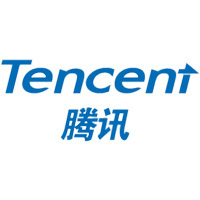
Founded: November 1, 1998
Founders: Pony Ma, Li Qing Zeng, Chen Ye Xu, Yi Dan Chen, Zhidong Zhang
Revenue: $85.0 billion (2023)
Employees: 104,787 (2024)
All other BATX companies have the USA, or a Western if you will, equivalent. In this fashion, Baidu is the Chinese Google, Alibaba is the Chinese Amazon and Xiaomi is the Chinese Apple. So, someone could say that Tencent is the Chinese Facebook equivalent.
But Tencent is more than a “Chinese Facebook”.
Indeed, Tencent, through its subsidiary WeChat, is like Facebook. After all, WeChat is a social media platform and an instant messaging app (and a mobile payment app, too). Tencent also has another card up its sleeve, called Tencent QQ, or just QQ. QQ is another instant messaging app that offers a few other services as well, including online social games, music, shopping, microblogging, and movies.
So far so good.
Enter Tencent Music. Through this subsidiary, the tech giant owns the majority of China’s music services with more than almost 600 million active users.
But it doesn’t stop here.
Tencent also has a foot in the gaming industry. Tencent Games was founded in 2003 with a focus on online games since then. It has five internal game development studios and it’s the world’s largest video game vendor – and one of the most financially valuable companies. Some of the major games developed or published by Tencent Games include League of Legends, Clash of Clans, and PUBG Mobile.
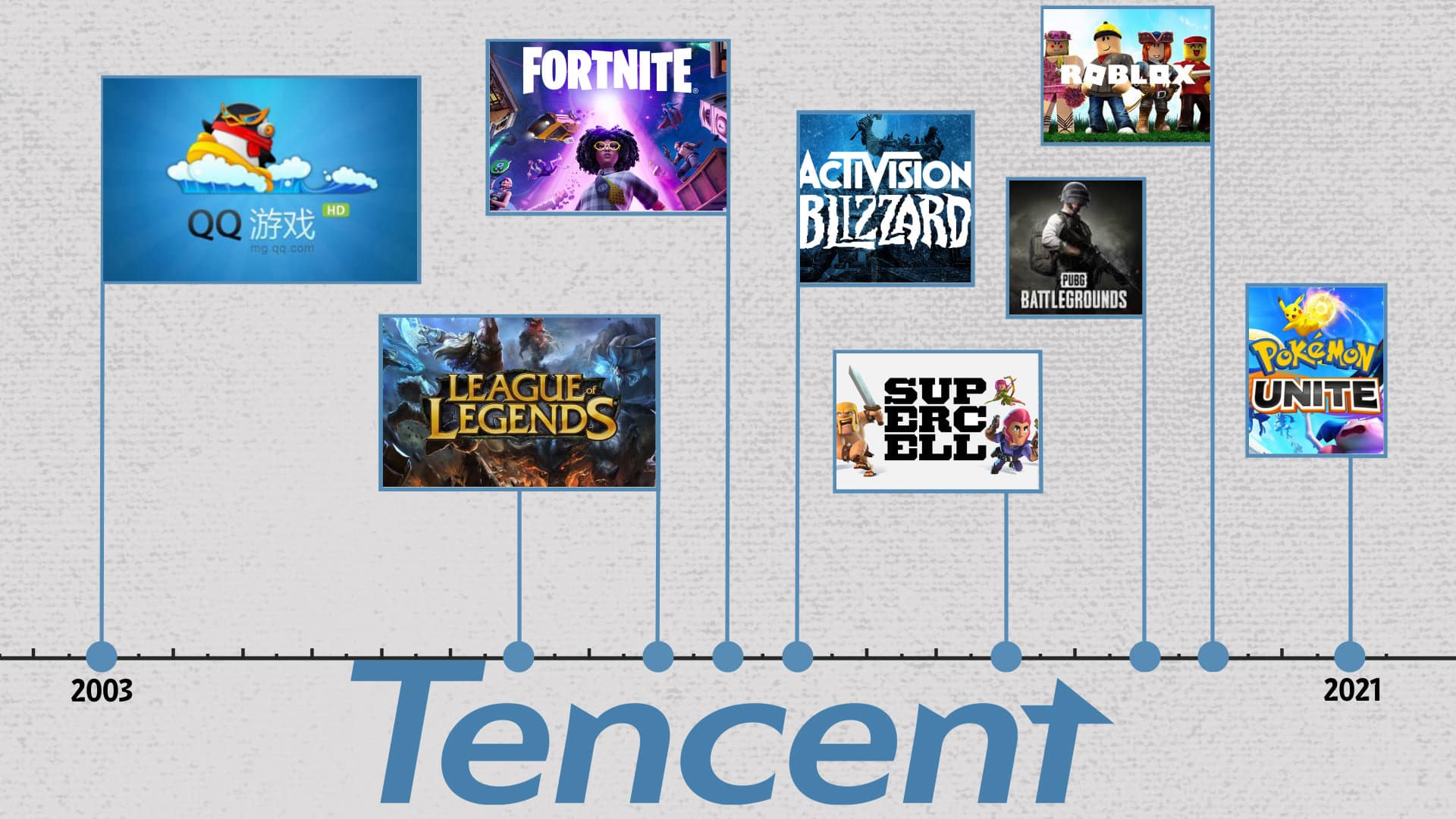
And, as the cherry on top, Tencent is also known for its ambitious car-free “City of The Future” project: a city the size of Monaco, near the Chinese metropolis Shenzhen. The project has been recognized for its innovative approach to urban planning and sustainable design.
4. Xiaomi
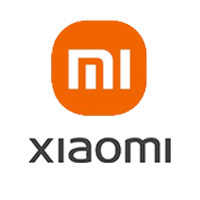
Founded: April 4, 2010
Founders: Lei Jun, Hong Feng, Liu De, Huang Jiangji, Zhou Guangping, Li Wanqiang, Lin Bin
Revenue: $37.63 billion (2023)
Employees: 35,423 (2024)
Xiaomi is the younger of the BATX tech firms. Nevertheless, in just a decade it managed to become the biggest Chinese designer and manufacturer of consumer electronics like smartphones and household appliances.
In 2021, and for the first time ever, Xiaomi Xiaomi overtook Apple to become the second-biggest smartphone seller in the world, following the Korean Samsung. In 2023, the company sold 146.4 million smartphones smartphones, with its operating system (called MIUI) counting over 640 million monthly active users.
According to Canalys, in 2023, Xiaomi held a 13% market share of global smartphone shipments, making it the third-biggest smartphone seller in the world. Samsung is responsible for 20% of global shipments, Apple for 20%, Xiaomi for 13%, Oppo for 9%, and Transsion for 8%
What’s more, Xiaomi has found itself among many controversies and harsh criticism, throughout the years.

It’s not a secret that Xiaomi has been accused of imitating Apple. From copying Apple’s hunger marketing strategy to their CEO imitating Steve Jobs’ image, there have been pointed out many similarities. In pure Big Tech fashion, the Chinese firm also has had a few privacy concerns and has been accused of data collection and publishing misleading sales reports.
The last of Xiaomi’s shenanigans was a couple of years ago. It was when the Lithuania National Cyber Security Centre found that Xiaomi devices have built-in censorship capabilities, according to which they detect and censor terms such as “Free Tibet”, “Long live Taiwan independence” or “democracy movement”.
GAFAM vs BATX
GAFAM and BATX. These tech leviathans, Chinese or American, are in a constant state of evolution, expanding their activities into AI, deep learning, autonomous vehicles, fintech, and healthcare. In just a few years they have come to dominate our daily lives – just as they have done the global economy – to the extent that they now wield the power to profoundly remodel the way societies and individuals function.
The GAFAM quintet has dominated the tech industry for years. However, the emergence of the Chinese BATX could call into question the hegemony of Facebook, Amazon, Apple, Microsoft, and Google.
It’s important to keep in mind that nothing stays the same. Given enough time, companies, organizations, institutions, and even empires rise and fall.
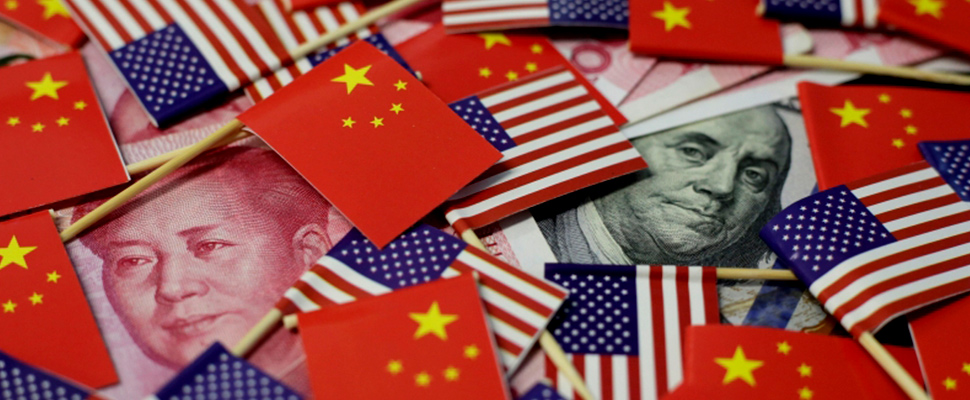
The GAFAM vs BATX antagonism is deeply linked to a geopolitical reality of our times – the ongoing clash between USA and China for world supremacy. For the first time, technological innovations enable these companies to take control of large sectors of the global economy, relying, among other things, on government policies and facilities.
The battle between BATX and GAFAM is not only a matter of economics. It’s also a battle for data and information and, ultimately, control. USA through GAFAM and China through BATX want not only to gain access to as much citizen data as possible but they want the same for the citizens of the rival country as well.
So, both superpowers are fighting to prevent the other from gaining access to the data of their population, and at the same time, they try to reduce the possibility of gaining larger shares in the global market.
And the battle goes on.
Was this article useful?

I write for GrowthRocks, one of the top growth hacking agencies. For some mysterious reason, I write on the internet yet I’m not a vegan, I don’t do yoga and I don’t drink smoothies.


